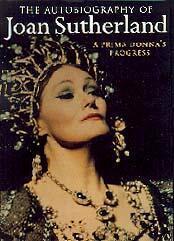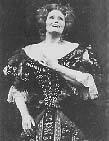A Prima Donna’s Progress by Philip Anson
/ February 1, 1998
by Philip Anson
An Interview with Joan Sutherland
 Last month Dame Joan Sutherland was
in New York to launch her new autobiography, A Prima Donna’s
Progress (Regnery Publishing, Inc.Washington , D.C. ISBN
0-89526-374-2). Lines stretched around the block for her masterclass
and symposium with Marilyn Horne at the Julliard School of Music,
followed by a book signing at the Metropolitan Opera shop. Many of
the faithful had probably never heard Sutherland in her prime; they
just wanted to glimpse the 71-year old legend. Older fans flocked to
express their gratitude for the operatic thrills Sutherland had
given them in the decades prior to her 1991 retirement. Last month Dame Joan Sutherland was
in New York to launch her new autobiography, A Prima Donna’s
Progress (Regnery Publishing, Inc.Washington , D.C. ISBN
0-89526-374-2). Lines stretched around the block for her masterclass
and symposium with Marilyn Horne at the Julliard School of Music,
followed by a book signing at the Metropolitan Opera shop. Many of
the faithful had probably never heard Sutherland in her prime; they
just wanted to glimpse the 71-year old legend. Older fans flocked to
express their gratitude for the operatic thrills Sutherland had
given them in the decades prior to her 1991 retirement.
I was fortunate to speak with Dame Joan in her suite at the cozy
Lotos Club, her Manhattan digs since1963. Though suffering from a
bad chest cold, the diva is a trouper, as befits a former daughter
of the regiment. She wore one of those sensible boxy suits designed
by some sartorial Svengali to offset her athletic figure. When she
turned to put down her needlepoint, I noticed that her famous
crescent-moon profile has softened with age. She still has the
energy of a woman half her age, though the towering casque of auburn
hair that Noël Coward once compared to the MGM lion’s is now touched
with grey. After fiddling with the air conditioning (like any
nervous singer), she confessed that writing an autobiography hadn’t
been her idea.
British publishing magnate Lord Weidenfield, who was also a
director of the Royal Opera, Covent Garden, urged her to share her
experiences with the reading public. "He guessed it would take about
eighteen months to write but I knew he was dreaming." In the end the
486-page tome, started in 1992, took 4 1/2 years. The narrative
carries us from turn-of-the-century Australia to the diva’s 1994
cameo as Mother Rudd in the outback movie Dad and Dave On Our
Selection.
At least four major Sutherland biographies have appeared in
recent years with her cooperation, but none of them was officially
authorized. Sutherland approves of Norma Major’s book but was
"rather cross" with Quaintance Eaton for not letting her read
Eaton's manuscript before it was published. "Quaintance’s book is
dicey. There are several errors I could have corrected."
Sutherland’s habit since 1947 of keeping every concert program and
press clipping guaranteed that her own book would be thoroughly
documented. "We kept scrapbooks because my husband knew that someone
might want to write a biography. I never thought it would be me."
Sutherland started out typing the book on a word processor, which
was easy because she had worked as a stenographer back in the 1940s.
But she found that the computer screen hurt her eyes, so she
finished the manuscript in longhand and her secretary transcribed
it.
The result is a painstakingly detailed enumeration of every
costume, rehearsal, performance, curtain call, colleague, party,
voyage and recording session in Joan Sutherland’s forty-year career.
Sutherland is aware that the book has been faulted for these laundry
lists and is the first to admit that she is not a born writer.
"Perhaps it is rather factual and maybe it is too detailed. Yes, I
even mention when I went to the hairdresser. But I was trying to
show young artists how much more is involved in a career than just
singing." Unfortunately the book contains almost no maxims or advice
that might be useful for young singers. Sutherland also includes
innumerable (mostly good) newspaper reviews. "I reprinted my early
crits to illustrate the way my voice progressed. Reviews certainly
gave me the confidence to continue in what turned out to be the
right direction."
As Canadian opera buffs know, Sutherland had a special
relationship with Canada, making many of her world debuts in
different roles in Vancouver and Toronto: as Donna Anna (1958),
Norma (1963), Lucrezia Borgia (1972),  Anna
in The Merry Widow (1976) and Sita in Le Roi de Lahore
(1977). Her book fondly mentions Canadian singers Joseph Rouleau,
Pierrette Alarie, Léopold Simoneau, Huguette Tourangeau, and Judith
Forst. "Joan was already famous when she came to Vancouver," recalls
Irving Guttman, artistic director of the Vancouver Opera Association
in the early 1960s. "So we were honoured to have her. She helped put
Vancouver on the world opera map and she helped several young
Canadian singers like Tourangeau." Guttman isn’t surprised that
Sutherland’s autobiography takes no risks. "That’s the way Joan was,
a very hard worker but quiet and unassuming. A gossipy book wouldn’t
be like her at all." Regarding her husband Richard Bonynge’s
controversial years as the head of the Vancouver Opera Association
(1973-1980), Sutherland plays dumb. For a full account of that story
one must refer to previous Sutherland biographies and David
Watmough’s excellent biography of Irving Guttman, The Unlikely
Pioneer (Mosaic Press). Anna
in The Merry Widow (1976) and Sita in Le Roi de Lahore
(1977). Her book fondly mentions Canadian singers Joseph Rouleau,
Pierrette Alarie, Léopold Simoneau, Huguette Tourangeau, and Judith
Forst. "Joan was already famous when she came to Vancouver," recalls
Irving Guttman, artistic director of the Vancouver Opera Association
in the early 1960s. "So we were honoured to have her. She helped put
Vancouver on the world opera map and she helped several young
Canadian singers like Tourangeau." Guttman isn’t surprised that
Sutherland’s autobiography takes no risks. "That’s the way Joan was,
a very hard worker but quiet and unassuming. A gossipy book wouldn’t
be like her at all." Regarding her husband Richard Bonynge’s
controversial years as the head of the Vancouver Opera Association
(1973-1980), Sutherland plays dumb. For a full account of that story
one must refer to previous Sutherland biographies and David
Watmough’s excellent biography of Irving Guttman, The Unlikely
Pioneer (Mosaic Press).
When I confronted Sutherland about her "speak no evil" writing
style, she explained that her book was first published in England
where strict libel laws apply. Lord Weidenfield’s lawyer vetted the
manuscript and Sutherland was obliged to delete three pages of
quotations. "Anyway, I am not very keen on gossip," she claims,
despite a copy of Kitty Kelly’s The Royals on her bedside
table. "Someone gave it to me because they thought it was banned in
Europe. But I really don’t like it, it is so rubbishy!"
Discretion may be the better part of valour, but it is the worst
part of biography. Sutherland’s book is full of potentially
fascinating moments, like vacations with Noël Coward, a game of
strip poker with James Morris (we also learn that Morris was
arrested in Vancouver for possession of an illegal weapon which he
showed to a prostitute), and a horse that farted in Fiorenza
Cossuto’s face. Sutherland alludes to "hilarious times" and "many
laughs" but, alas, she can’t tell a joke. The only time she gets
personal is against conductors like Nello Santi and
Molinari-Pradelli who didn’t do things the Sutherland-Bonynge way.
She also has harsh words for Pavarotti’s lack of preparation for the
recording of Donizetti’s Maria Stuarda. When I mentioned that
Pavarotti was opening the Metropolitan Opera’s L’Elisir
d’Amore in just a few hours, Dame Joan presciently remarked that
he will probably cancel (indeed he did withdraw after two
performances).
As far as the
written word goes, A Prima Donna’s Progress is La Stupenda’s
final testament. Though she has benefitted enormously from the vocal
treatises written in previous centuries, she will not be writing any
technical manuals herself. "I’m sick of books," she sighs. "I just
want to go home to Switzerland for a jolly good rest." None of her
fans will deny that she has earned it. Note: London-Decca will
release its 1987 Sutherland-Pavarotti recording of Verdi’s
Ernani for the first time
in March 1998.
|
|


